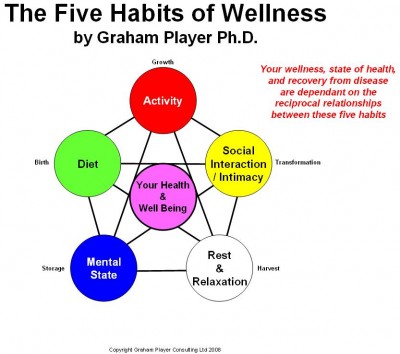The 5 Habits
The 5 Habits of Wellness
What is Wellness
- * Previously it was hardly understood
- * Now it is grossly misunderstood
- * It has become a descriptive term of something to help improve our well-being
- * Halbert Dunn, 1961 in “High-Level Wellness” described it as:
“an integrated method of functioning whereby individuals maximize their potential to function in any aspect of life”
Wellness is much more than just health!
My Definition of Wellness
The body’s ability to maintain and remain as close to its peak for as long as possible in the following areas:
- * Bodily-systems functioning
- * Vitality
- * Free of degenerative-disease
This is quite a different state to simply what may be described as health!
Health versus Wellness
| Health | Wellness |
|---|---|
| Enables us to live the life we want to live NOW | Enables us to live the life we want to live INTO THE FUTURE |
| Can be checked against a given model of “health-tests” | There is no model of “wellness-tests” |
| Is a measure of an immediate and current state | Is a measure of an ongoing state |
Being healthy is more than just being free of symptoms. It requires the following from you:
- * caring enough for yourself to be ‘in-tune’ with your own body – i.e. having a degree of self awareness of your own feeling of your state of health
- * having sufficient knowledge about health and wellness to be able to help yourself and to determine the viability of what others may be advising or telling you
- * developing the right ‘habits’ which I call the 5 Habits of Wellness
Perhaps in the enthusiasm to understand disease, critical knowledge about health has been overlooked!
Health and wellness are more than simply the absence of disease. Yet there seems to be no agreed and accepted definition of health even amongst the medical profession.
Our ‘health-system’ is actually a system focused on treating disease. Isn’t it time we had a system that focused on maintaining health and preventing disease? Consider too that the top three causes of mortality (cancer, heart disease, stroke) are all considered and agreed to be lifestyle related… Graham Player
All truth goes through three stages. First it is ridiculed. Then it is violently opposed. Finally it is accepted as self-evident.
The doctor who first proposed washing of hands to stop the spread of disease was ridiculed and then violently opposed by the experts of the time. But now it is self-evident. You can check it out for yourself …. Graham Player
Modern medicine seems to be at the first stage of considering this truth – i.e. the stage of ridicule.
The Science of modern medicine is 200+ year-old Newtonian Science based on the principles of matter and individual components. Contemporary Science is that of Quantum Science regarding everything as energy. There are discoveries being made and breakthroughs happening as a result of the coming together of quantum physics, cellular biology and the fundamental principles of traditional Chinese Medicine which may transform our understanding of disease, health, how to get well, and how to stay well…. Graham Player
Your wellness, state of health and recovery from disease are dependent upon the reciprocal relationships between only five habits…. Graham Player


I completely support Graham’s wellness orientation toward the future. The single most important mind-shift to live a healthier, happier, more creative and productive life is to be aware and mindful of the effect of one’s current actions on the future. When I do Life Mapping with my client’s, I get them to display the future world they want to live in, and then help them discover ways to begin using their Life Map as a guide to how they live in the present. Without that orientation, our culture generally encourages us to live in the present, which ignores activities with future but little present payoff.